Anatolian - Study guides, Class notes & Summaries
Looking for the best study guides, study notes and summaries about Anatolian? On this page you'll find 27 study documents about Anatolian.
All 27 results
Sort by
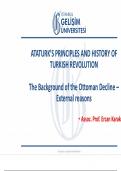
-
PRINCIPLES AND HISTORY OF TURKISH REVOLUTION
- Exam (elaborations) • 22 pages • 2024
-
- $19.99
- + learn more
The Background of the Ottoman Decline – External Reasons • The conditions in the Empire • The Ottoman Empire expanded its lands and wealth through the war against the fragmented European and Anatolian states at the beginning until the conquest of Istanbul in 1453. • The storm of the Ottoman conquest reached at the doors of the Vienna in the West, Qazvin in the East, Aden in the South and the Don River in the North. • However, this expansion embodied many ethnic and religious gro...
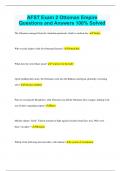
-
AFST Exam 2 Ottoman Empire Questions and Answers 100% Solved
- Exam (elaborations) • 4 pages • 2024
- Available in package deal
-
- $9.99
- + learn more
AFST Exam 2 Ottoman Empire Questions and Answers 100% Solved The Ottomans emerged from the Anatolian peninsula, which is modern day: Turkey Who was the leader of the first Ottoman Dynasty? Osman Bey What does the term Ghazi mean? "warriors for the faith" Upon building their army, the Ottomans went into the Balkans and began, primarily, recruiting who? Christian children Prior to crossing the Bosphorus, what Christian city did the Ottomans first conquer, making it the seat of their expandin...
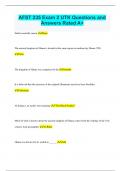
-
AFST 235 Exam 2 UTK Questions and Answers Rated A+
- Exam (elaborations) • 10 pages • 2024
- Available in package deal
-
- $9.99
- + learn more
AFST 235 Exam 2 UTK Questions and Answers Rated A+ Sahil essentially means Shore The ancient kingdom of Ghana is located in the same region as modern day Ghana (T/F) False The kingdom of Ghana was comprised of the Soninke It is believed that the ancestors of the original Ghanaians may have been Neolithic Fishermen Al-Sudan is an Arabic term meaning "The Black Peoples" Much of what is known about the ancient kingdom of Ghana comes from the writings of the 11th century Arab geographer Al-Ba...
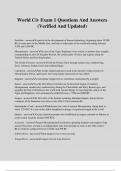
-
World Civ Exam 1 Questions And Answers (Verified And Updated)
- Exam (elaborations) • 5 pages • 2024
-
- $10.49
- + learn more
World Civ Exam 1 Questions And Answers (Verified And Updated) Neolithic - answera period in the development of human technology, beginning about 10,200 BC in some parts of the Middle East, and later in other parts of the world and ending between 4,500 and 2,000 BC. Mesopotamia - answerthe area of the Tigris-Euphrates river system, in modern days roughly corresponding to most of Iraq plus Kuwait, the eastern parts of Syria, and regions along the Turkish-Syrian and Iran-Iraq borders. The F...
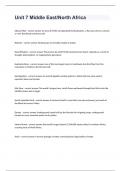
-
GLST 200 Liberty University -Unit 7 Middle East fully solved
- Exam (elaborations) • 1 pages • 2024
- Available in package deal
-
- $10.49
- + learn more
Unit 7 Middle EastAlluvial Plain - correct answer An area of fertile soil deposited by floodwaters; a flat area next to a stream or river that floods and leaves silt. Bedouin - correct answer Small groups of nomadic people in Arabia. Desertification - correct answer The process by which fertile land becomes desert, typically as a result of drought, deforestation, or inappropriate agriculture. Euphrates River - correct answer one of the two largest rivers in Southwest Asia that flow from...
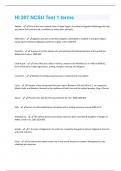
-
HI 207 NCSU Test 1 terms Questions And Answers Graded A+
- Exam (elaborations) • 4 pages • 2024
-
- $7.99
- + learn more
Abydos - One of the most ancient cities of Upper Egypt. According to Egyptian Mythology-the holy city where Osiris was buried, in addition to many other pharaohs Akhenaton - Egyptian pharaoh of the New Kingdom; attempted to establish a one-god religion, replacing the traditional Egyptian pantheon of gods. BCE Amorites - A group of semitic people who overwhelmed the Mesopotamians and founded the Babylonian Empire, 2000 BCE Catal Huyuk - One of first true cities in history, created in the N...
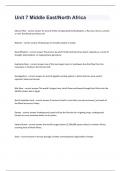
-
Unit 7 Middle East GLST 200 Liberty University Questions with complete solution
- Exam (elaborations) • 1 pages • 2024
-
Available in package deal
-
- $13.99
- + learn more
Unit 7 Middle East GLST 200 Liberty University Questions with complete solution Unit 7 Middle East/North Africa Alluvial Plain - correct answer An area of fertile soil deposited by floodwaters; a flat area next to a stream or river that floods and leaves silt. Bedouin - correct answer Small groups of nomadic people in Arabia. Desertification - correct answer The process by which fertile land becomes desert, typically as a result of drought, deforestation, or inappropriate agriculture....
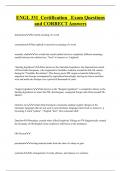
-
ENGL 331 Certification Exam Questions and CORRECT Answers
- Exam (elaborations) • 6 pages • 2024
-
- $8.99
- + learn more
denotationthe literal meaning of a word connotationthe implied or associative meaning of a word semantic clashtwo words that sound similar but have completely different meanings; usually between two dialects (ex: "boot" in America vs. England) "farming hypothesis"also known as the Anatolian hypothesis; the dispersal/movement of Proto-Indo-Europeans, who originated in Neolithic Anatolia, around the 6th-7th century during the "Neolithic Revolution"; This theory posits PIE origin in ...
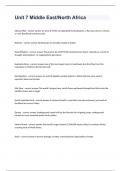
-
Unit 7 Middle East/North Africa questions with 100% correct answers
- Exam (elaborations) • 1 pages • 2024
-
Available in package deal
-
- $9.99
- + learn more
Unit 7 Middle East/North Africa questions with 100% correct answersAlluvial Plain - correct answer An area of fertile soil deposited by floodwaters; a flat area next to a stream or river that floods and leaves silt. Bedouin - correct answer Small groups of nomadic people in Arabia. Desertification - correct answer The process by which fertile land becomes desert, typically as a result of drought, deforestation, or inappropriate agriculture. Euphrates River - correct answer one of the tw...
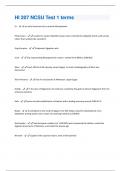
-
HI 207 NCSU Test 1 terms Questions And Answers Rated A+
- Exam (elaborations) • 4 pages • 2024
- Available in package deal
-
- $7.99
- + learn more
Ur - an early Sumerian city in ancient Mesopotamia Phoenicians - Located on eastern Mediterranean coast; invented the alphabet which used sounds rather than symbols like cuneiform King Scorpion - Predynastic Egyptian ruler Uruk - City representing Mesopotamian culture- existed from 4000 to 2900 BCE Weni - Court official of 6th dynasty ancient Egypt. In tomb, Autobiography of Weni was discovered. Tell el-Amarna - Site of ruins/tombs of Akhetaton. Upper Egypt Enkidu - In the epic of Gilgam...

How much did you already spend on Stuvia? Imagine there are plenty more of you out there paying for study notes, but this time YOU are the seller. Ka-ching! Discover all about earning on Stuvia


